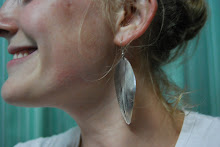
I like my cuppa tea now and then, but whoa...
So when the Dutch Empire began exporting goods from Asia, namely "exotic" teas from Darjeeling, India (where it had been used therapeutically for while already) back to Queen Victoria of England, there began an amazing story of poppies and globalization. Vicky's desires for tea quickly became trend and soon all of England was tea crazed. Tea was determined to be best consumed in porcelain, so thus began the rise in porcelain production--a minor note, but interesting. Of course, tea was significantly improved with a bit of sugar to enhance it's bitter flavor. Thus began the need to also create and export sugar. Thus began the slave trade to sugar plantations in the Americas (here's one more reason for me to boycott sugar... as if being diabetic wasn't enough) Tea was also implicated in the American Revolution, due to it's culpricity in the Boston Tea Party.
Ok, so fascinating chain of events, but stay with me here...
Meanwhile in, for the most part, unexploited lands of native communities in Asia, such as the Golden Triangle (where Burma, Lao and Thailand meet in the north), Turkey and Afghanistan, poppy fields were being harvested as usual for therapeutic and medicinal purposes (easing pain mostly.)
The East Indian Trading Company began to sell opium in order to pay it's tea expenses. Conflict quickly arose between commercially powerful Britain and opium controlling China. Thus began the opium wars. These wars ended when Britain forced unequal treaties upon China which left China with incredibly restricted export regulations and they had to fork over Hong Kong with a cherry on top for the subsequent 155 years to British occupation. China, depleted not only by Britain, but also by opium--economically and physically as so many of the population were addicted and severely ill (1 in 30.) China had a revolution, which lead to the modern Chinese power. China desperately wanted to stop opium traffiking because of the extensive damage.
The opium trading restrictions simply lead to a rise in sales and use/abuse in Siam (now Thailand) and its imports to the west. Thais were imposed by an unlimiting importation of opium. Later the American CIA covertly endorsed opium production in Thailand (specifically the area of the "Golden Triangle") the intention was to compete with and defeat opium efforts in Communist China, the American enemy. CIA endorsement of opium production was underway in Afghanistan as well, to fund and supply weapons to the Afghan people as allies to the American enemy, Communist Russia. In Afghanistan these efforts lead to its neighboring consumers, Pakistan, currently becoming one of the highest density populations of Heroin addiction in the world.
Incidentally, opium is made for consumption by boiling the raw material from poppies to eliminate impurities, it is then reduced to a thick and beautiful molasses-esque batter. So intense in fact that critter-passers-by keel over dead simply due to the toxic fumes. Not just weak tiny bug respiratory systems, but big critters.. die. Anyway, the development of the more common powdered heroin substance came to be because of the ease of transport, particularly to America, where it was purchased from various mafia cohorts and sold with additives for bulking (powdered sugar or various other, often rather dangerous, substances.) This powder is typically snorted, boiled with water and injected, or boiled all the way to its original form and smoked.
Now, back to the impacts of mass, unregulated production of opium; in Thailand opium was so widely available that the degrees of addiction warranted grand intervention by the present royal family. The beloved King of Thailand made great strides in the illegalization and banishment of recreational opium, but because addiction is, well, addictive, a new drug simply took the lead. Methamphetamine, in Thai: Ya Ba (meaning insane medicine) became the drug of choice, particularly for Thai youth. Now public health measures are making a big difference in its rates of abuse and rehabilitation... and now alcoholism is on the rise.
Unfortunately, I'm sure, this will not be The End of the amazing story of poppies and globalization.
This has been a public service announcement from your friendly global nursing student. Thank you for listening!
Vast flood of information credited to the Hall of Opium in the "Golden Triangle" Chiang Rai province of Northern Thailand. Photo courtesy of google images.
.JPG)
.JPG)
.JPG)
.JPG)
.JPG)














.JPG)
.JPG)
.JPG)
.JPG)
.JPG)
.JPG)










